904L stainless steel material
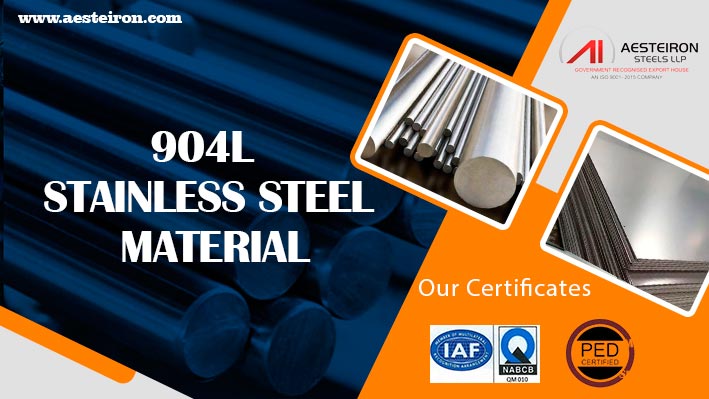
Stainless Steel 904L is an austenitic stainless steel known for its excellent corrosion resistance across a wide range of environments. Its unique combination of alloying elements provides strong protection against harsh conditions, while its austenitic structure ensures outstanding toughness and strength even at sub-zero temperatures. This makes it ideal for use in challenging industrial applications where durability and performance are crucial.
Table of contents
- Stainless Steel 904L Chemical Composition
- SS 904L Mechanical Properties
- Physical properties of INOX AISI 904L
- AISI 904L Welding Process
- SUS 904L Mean Coefficient of Thermal Expansion
- Corrosion Resistance of Alloy 904l
- Corrosion Rates of 904L Material
- Chemical Compatibility of Stainless Steel Alloy 904L
- UNS N08904 Material Temperature Range
- Type 904L Stainless Steel Thermal Properties
- AISI 904L Equivalent grades
- Specifications of SUS 904l Material
- SAE 904l Electrical Properties
- Din 1.4539 Applications
- Advantages & Disavntages of SS 904l Material
- Hot Forming of SUS 904l
- Cold Forming of SS 904L
- Machining of Stainless Steel Alloy 904L
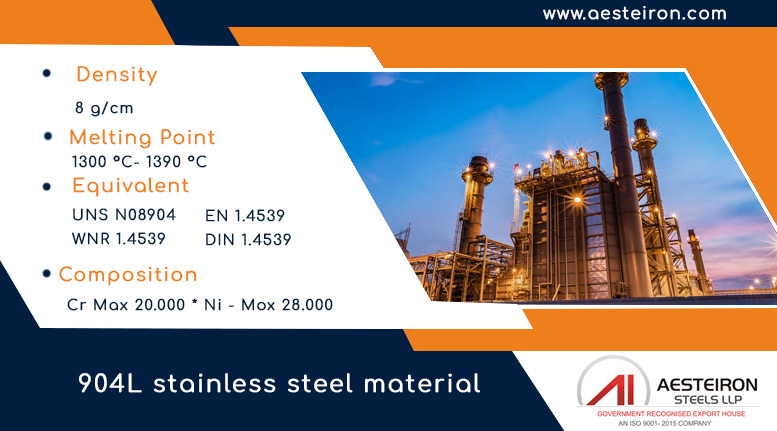
Stainless Steel 904L Chemical Composition
SS 904L Mechanical Properties
| Grade | Yield Strength 0.2% Proof (MPa) min | Tensile Strength (MPa) min | Elongation (% in 50mm) min | Hardness | |
|---|---|---|---|---|---|
| Brinell (HB) | Rockwell B (HR B) | ||||
| 904L | 220 | 490 | 36 | 150 | 70-90 typical |
Physical properties of INOX AISI 904L
| Density | kg/dm³ | 8 |
|---|---|---|
| Modulus of elasticity | GPa | 195 |
| Thermal Capacity | J/kg°C | 450 |
| Electrical resistivity | µΩm | 1 |
| Thermal conductivity | W/m°C | 15.8 |
Alloy 904L Offers Excellent Formability and Weldability
Being non-magnetic, this grade is highly formable and easy to weld, making it suitable for complex shapes and structures without compromising its integrity. It can be shaped into various forms with minimal risk of damage, ensuring high-quality end products in a variety of industries.
AISI 904L Welding Process
- TIG
- MIG
- SMAW
- PAW
- SAW
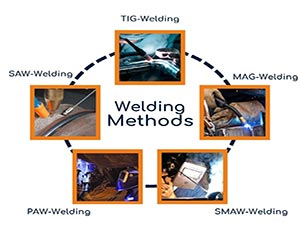
SUS 904L Mean Coefficient of Thermal Expansion
| Yield Strength 0.2% Offset psi (MPa) | Ultimate Tensile Strength psi (MPa) | Hardness | Elongation in 2 in. % | ||
|---|---|---|---|---|---|
| 31,000 | 220 | 71,000 | 490 | 70 – 90 Rockwell B | 36 |
1.4539 Material is Known for Its Corrosion Properties
As a low-carbon, high-alloy austenitic stainless steel, 904L is primarily used for its exceptional corrosion resistance. The addition of copper enhances its ability to withstand aggressive environments such as sulfuric, phosphoric, and acetic acids. It also shows high resistance to pitting and crevice corrosion in chloride solutions, along with good resistance to stress corrosion cracking.
Corrosion Resistance of Alloy 904l
- Good Resistance to Uniform Corrosion
- Temperatures up to 95°F (35°C)
- Concentration Range of 0 to 100%.
- A Nickel content of 25%, 904L is a good Alternative
- Susceptible to Chloride Stress Corrosion Cracking
- 904L Have Good Resistance to SCC
Minimum Stress For Failure % of Rp0.2 at 200°C
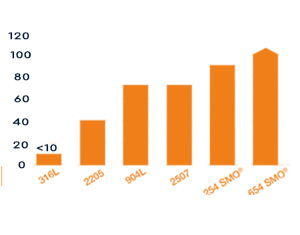
Typical threshold stresses determined using the drop evaporation test.
Temperature, °C
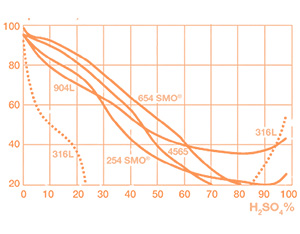
Isocorrosion curves 0.1 mm/year, in pure sulphuric acid.
Corrosion Rates of 904L Material
| Uniform corrosion | Corrosion, (mm/year) |
|---|---|
| pickling acid at 25°C | 0.47 |
| wet process Phosphoric acid at 60°C | 1.2 |
| Distillation of Tall oil at 253°C | 0.06 |
SUS 904L Has High Concentrations of Chromium, Nickel and Molybdenum
The high levels of chromium, nickel, and molybdenum contribute to its excellent corrosion resistance, particularly against chloride stress corrosion cracking, pitting, and general corrosion. These elements ensure that the material performs well in aggressive chemical environments.
Chemical Compatibility of Stainless Steel Alloy 904L
| Chemical | Compatibility |
|---|---|
| Sulfuric Acid (Hâ‚‚SOâ‚„) | Good resistance ; avoid concentrated acid. |
| Hydrochloric Acid (HCl) | Better resistance compared to many other stainless steels, especially at lower temperatures. |
| Nitric Acid (HNO₃) | Good resistance, particularly up to 65% concentration at room temperature. |
| Phosphoric Acid (H₃PO₄) | Good performance in moderate concentrations and temperatures. |
| Sodium Hydroxide (NaOH) | Resistant, especially in lower concentrations |
| Sodium Chloride (NaCl) | Resistant but prone to stress corrosion cracking in high chloride environments. |
| Acetone | Generally compatible. |
| Ethanol | Generally compatible. |
| Formic Acid | Shows good resistance. |
| Oxidizing Agents | Resistant to many oxidizing agents. |
| Hydrogen Sulfide (Hâ‚‚S) | Susceptible to stress corrosion cracking, especially under high temperature. |
SS 904L is Heat Resistant Alloy Designed for High Temperature Structural Applications
This grade is suitable for use in high-temperature environments due to its remarkable heat and corrosion resistance. It is widely used in the chemical and petrochemical industries, where materials must endure both corrosive conditions and elevated temperatures without losing structural integrity.
UNS N08904 Material Temperature Range
| Temperature Range | Performance |
|---|---|
| Cryogenic Temperatures (< -200°C / -328°F) | Generally suitable |
| Ambient to Moderate Temperatures (up to ~400°C / 750°F) | Excellent performance |
| High Temperatures (~400°C to 800°C / 750°F to 1470°F) | Capable of withstanding moderate temperatures |
| Exceeding 800°C / 1470°F | The material is generally not recommended for such high temperatures. |
Type 904L Stainless Steel Thermal Properties
| Thermal Properties | Metric | English |
|---|---|---|
| CTE, linear | 15.3 µm/m-°C Temperature 20.0 – 100 °C |
8.50 µin/in-°F Temperature 68.0 – 212 °F |
| 16.5 µm/m-°C Temperature 20.0 – 400 °C |
9.17 µin/in-°F Temperature 68.0 – 752 °F |
|
| 18.2 µm/m-°C Temperature 20.0 – 800 °C |
10.1 µin/in-°F Temperature 68.0 – 1470 °F |
|
| Specific Heat Capacity | 0.460 J/g-°C | 0.110 BTU/lb-°F |
| Thermal Conductivity | 11.5 W/m-K Temperature 20.0 °C |
79.8 BTU-in/hr-ft²-°F Temperature 68.0 °F |
| 12.9 W/m-K Temperature 100 °C |
89.5 BTU-in/hr-ft²-°F Temperature 212 °F |
Refer 904L Material Equivalent, Composition and Specification
Equivalent grades allow users to identify the same material in different countries, which is essential for international trade. Knowing the equivalent grade ensures that the material meets the required specifications and properties for the intended application.
Understanding the chemical composition is vital in manufacturing stainless steel, as it determines the material’s mechanical properties, including strength, toughness, and ductility. This helps the product withstand corrosive or harmful conditions effectively.
Specifications provide standardized information on the material's properties, helping users determine where and how it can be applied. This ensures that the material is used appropriately in different industrial settings.
AISI 904L Equivalent Grades
| Grade | UNS No | Old British | Swedish SS | Euronorm | ||
|---|---|---|---|---|---|---|
| En | BS | No | Name | |||
| 904L | N08904 | – | 904S13 | 2562 | 1.4539 | X1NiCrMoCuN25-20-5 |
Specifications of SUS 904L Material
- Trade Names :SS 904L, AISI 904L, INOX 904L, SUS 904L, Stainless Steel 904L, 904L Steel, ASTM 904L
- Benefits :Non-magnetic, Excellent corrosion properties, Good resistance to sulphuric, Excellent formability and weldability
- Temperature Range :850 °C – 1150 °C
- Features :Lower carbon content leads to resistance to sensitization when welded, Increased resistance to chemical attack from acids
SAE 904L Electrical Properties
| Electrical Properties | Metric | English |
|---|---|---|
| Electrical Resistivity | 0.0000952 ohm-cm | 0.0000952 ohm-cm |
| Magnetic Permeability | <= 1.02 | <= 1.02 |
DIN 1.4539 Applications
- Organic Acid Treatment System
- Sea Water Heat Exchanger
- Paper Industry Equipment
- Heat Exchangers
- Condenser Tubes
- Gas Scrubbing Plants
- Pulp and Paper Processing Industries
Advantages & Disadvantages of SS 904L Material
Advantages
- Excellent Corrosion Resistance
- Good Strength and Toughness
- Good Formability & Durability
- It is Non-magnetic in the Annealed Condition
Disadvantages
- Expensive Material
- Not Ideal for Very High Temperatures
- Extremely High-temperature Applications
- Potential for Work Hardening
Hot Forming of SUS 904L
- Working temperatures:1562 – 2102°F (850 –1150°C)
- Forming Techniques:Forging, rolling, or extrusion
- Solution Annealed:1940 – 2084°F (1060 –1140°C).
- Partial Heating or Cooling :below 2012°F (1100°C)
Cold Forming of SS 904L
- Work Hardening: work-hardens significantly, cold working might require intermediate annealing.
- Nitrogen Implies more powerful processing equipment
- Ductile and Forms Easily
Machining of Stainless Steel Alloy 904L
- Makes it less Machinable
- More Challenging due to work hardening
- Using proper tooling and cutting fluids.
we are regular Trigger Sprayer,trigger spray head manufacturer ,with high quality control.
Normally used for window cleaning,car wash bottle sprayer,hair care sprayer,house cleaning, laundry care, & pet training.etc.
with adjustable spray/stream nozzle,foam nozzle,
There are 28/400 28/410 28/415 ratchet standard size ,with screw closure to fit with bottles.
Regular Trigger Sprayer,Trigger Spray Head,Spray Nozzle Trigger,Water Spray Nozzle Trigger For Bottle
NINGBO CRETE PLASTIC CO.,LTD , https://www.crete-sprayer.com